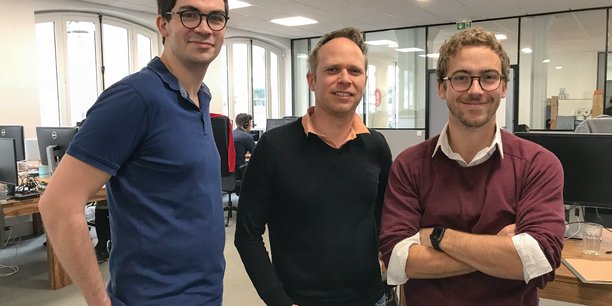While many e-health entrepreneurs have broken their teeth trying to break into the hospital fortress, will Lifen’s ‘one-size-fits-all’ technology finally succeed in lifting these? barriers? The startup aims to offer public and private health establishments the possibility of simply integrating innovations that make it possible to modernize and facilitate the treatment path.
To achieve this, his co-founder and CEO, Franck Le Ouay, former founder of Criteo – known as one of the very first big successes of French Tech – has just succeeded in a substantial fundraising of 50 million euros, carried out with the funds Creadev (France) and Lauxera Capital (United States). The third since its creation in 2015, after 7.5 million euros raised in 2018 and 20 million in 2019.
“Universal key” for the exchange of documents between practitioners in and outside the hospital
Now deployed in more than 570 public and private health establishments – against barely twenty three years ago – Lifen has attracted “big” such as the university hospitals of Strasbourg and Nice, or Ramsay Santé (number one in the private sector) thanks to its technology finally making it possible to solve the problem of interoperability between software. Its solution thus enables practitioners from different establishments or departments to send patient documents to each other in a simple and secure manner. This greatly facilitates patient follow-up and avoids diagnostic errors and redundant or unnecessary acts.
Thanks, among other things, to the interpersonal skills of the former Minister of Health Philippe Douste-Blazy, Lifen’s luxury sales representative, but above all to the quality of its solution, the startup has succeeded where many nuggets of the e- healthcare continue to fail: to pass through the doors of the hospital, an extremely regulated and highly complex fortress, between security and data protection requirements and the difficulty of convincing overworked practitioners to use a new tool. But Lifen broke down those barriers with his platform interoperable with 100% of DPI (computerized patient record), capable of interacting with all existing business software, and therefore offering practitioners simplified access to patient information. Its secret: going through the printer, a tool that equips all medical structures. The practitioner or the medical secretary can thus send any document (blood test, radio, scanner …) in a few seconds. The recipient receives it instantly while the document is “converted” to be readable by any business software.
The simplicity of the concept convinced: “ Every time we did a test, the hospital bought the solution behind », Says Franck Le Ouay. The startup has made a name for itself by marketing two services: Lifen Documents (exchange of documents between practitioners) and Lifen Planning (management and automation of on-call, on-call and service schedules). The startup also claims more than 2 million documents sent per month to more than 120,000 practitioners in France.
From a messaging system to a real innovation platform for the hospital
Since the start of 2021, the Parisian nugget has added a new string to its bow: Lifen Platform. ” It is a real marketplace that connects hospitals and practitioners on the one hand, with the innovations of e-health startups on the other. », Explains Franck Le Ouay. In other words, Lifen takes advantage of its solution capable of eliminating interoperability problems between software, to become the gateway and the nerve center of a large part of the hospital’s innovations.
“400 million euros were invested in e-health startups in 2020, but this wave of innovations is hitting the wall of integration in hospitals in full face, especially regulatory and safety constraints. We managed to unlock them for ourselves and get the certification Health Data Host. As we are able to make business software talk to each other, we can become the platform where e-health startups meet their users in three clicks. », Adds the entrepreneur.
For now, a dozen startups have taken the plunge, and Lifen hopes « around 30 at the end of 2022, around 50 in 2023 “. Care pathways, telemedicine, tele-expertise, therapeutic applications, training for doctors, medical devices … ” In France we still believe a lot that e-health comes down to teleconsultation, but it goes far beyond that, tomorrow e-health will reinvent all care. Each pathology, each drug will have its dedicated application to ensure the management and monitoring of the treatment. It is an inevitable transformation of the care pathway and Lifen wants to be the catalyst for these innovations. », Affirms Franck Le Ouay.
A place to take in Europe
To become a unicorn or even more, Lifen has opted for a Doctolib-style strategy: first to dominate its domestic market, France, then to expand into the surrounding countries in the hope of forging the stature of a European giant. The fundraising is aimed precisely at enabling Lifen to attack two crucial markets: Germany and the United Kingdom. ” Germany has the triple advantage of being the largest European market, of having a structure of hospitals on the territory similar to France, and of being behind in e-health while having a strong political will to fill it, which opens doors for us », Describes Franck Le Ouay.
The United Kingdom, much more mature in the digital transformation of hospitals, presents another challenge, but the startup is confident in its ability to find a place there due, she says, to less fierce competition than in the United States, where services like Commure – which raised $ 500 million in September – and Innovaccer are positioned with a similar offer.
Lifen intends to recruit 200 additional employees over the next 18 months, bringing its workforce to 360 people. Efforts will mainly focus on research and development (R&D) to improve the platform, and on sales forces to deploy its platform.

